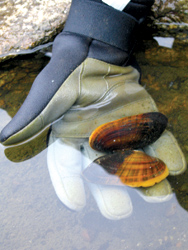You've probably never heard of the Appalachian elktoe mussel, but some local folks have — and they're trying to help the little mollusk survive. On the North Toe River just downstream from Spruce Pine, crews have removed the remnants of an old dam, hoping to re-establish the fish populations the endangered species depends on.

The elktoe mussel, U.S. Fish & Wildlife Service biologist Anita Goetz explains, spends part of its life attached to the gills and fins of a host fish (the mottled sculpin, for example). But obstructions such as dams and poorly designed bridges and culverts impede fish movement up and downstream, reducing population diversity and adversely affecting habitat. In the past, biologists found the elktoe, sculpin and even such rare fish as the olive and sharphead darters (last sighted decades ago) above the North Toe dam. Today, such species are found only downstream of it.
Small fish like these tend to be weak swimmers, so when old dams restrict their ability to circulate, the upstream populations eventually die off, she says. And with fewer fish to hitch a ride on, the elktoe (which can also be found in the more pristine upper French Broad River) also decline.
"We're hoping that [these] species can move upstream and re-populate," notes Goetz. But mussels, small fish and other aquatic life are also adversely affected by wastewater discharges and sediment buildup, she continues.
Freshwater mussels, in particular, are like canaries in coal mines: "When mussels disappear, other species do too," says fellow Fish & Wildlife biologist John Fridell. For starters, these species filter the water. In one experiment, biologists filled two aquariums with muddy water and placed mussels in one of them. "Within 30 minutes, the water was crystal-clear," he says. In addition, various aquatic-insect larvae use the mussel shells as their home base; fish then forage on the insects. Mink, muskrats, otters and raccoons feed on the mussels, and the resulting mussel-shell graveyards create fish habitat.
"Everything's connected," says Fridell.
Accordingly, Goetz hopes that other threatened, endangered and rare species in the North Toe will also get a boost from the dam's removal: the blotchside logperch, the mountain blotched chub and the wavy-rayed lampmussel, just to name a few. "When we opened up the right side of the river, fish were moving upstream immediately," she notes.
The Blue Ridge Grading and Trucking crews who did the heavy-equipment work were also pleased to see quick results, adds Goetz. "Many of them hadn't worked on such a project before. It was different from building roads, and they're our unsung heroes."
It takes a broad-based collaboration to save these creatures, she emphasizes. Much of the funding ($202,500) came from Fish & Wildlife, along with technical assistance on habitat restoration. But the dam-removal plan was drafted by the Asheville-based Altamont Environmental. And local nonprofits familiar with the area helped identify problem spots, write matching grants and coordinate river access with private landowners, says Goetz.
Other project partners include the state Division of Water Resources and the Blue Ridge Resource Conservation and Development Council. David Gillette, an assistant professor of environmental studies at UNCA, and his student Kaitlin Daniel took water and aquatic-life samples before the dam removal and plan to do follow-up monitoring, Goetz explains, saying, "We want to make sure that what we're doing is working."
She also points to some other benefits of trying to preserve these little mollusks. Hiring Blue Ridge and Altamont supports the local economy, and clearing the river channel opens up a roughly 40-mile stretch to local outfitters. In addition, it makes the river safer: In 1983, a recreational boater drowned when he was trapped in the wicked hydraulics created by the dam debris. That hazard is now gone.
And though the elktoe (whose shells used to be made into buttons) is typically unnoticed and underappreciated, notes Goetz, "A lot of folks pay attention to the warm-and-fuzzy [species], but although they're cold and clammy, they're very important for our water quality."
Fridell adds, "When we lose one species, it affects others up and down the food chain."
For more information on the Appalachian elktoe mussel, visit www.fws.gov/nc-es/mussel/appelk.html. To learn more about the North Toe project, visit www.mountainx.com/outdoors.
Send your environmental news to mvwilliams@mountainx.com, or call 251-1333, ext. 152.


Before you comment
The comments section is here to provide a platform for civil dialogue on the issues we face together as a local community. Xpress is committed to offering this platform for all voices, but when the tone of the discussion gets nasty or strays off topic, we believe many people choose not to participate. Xpress editors are determined to moderate comments to ensure a constructive interchange is maintained. All comments judged not to be in keeping with the spirit of civil discourse will be removed and repeat violators will be banned. See here for our terms of service. Thank you for being part of this effort to promote respectful discussion.